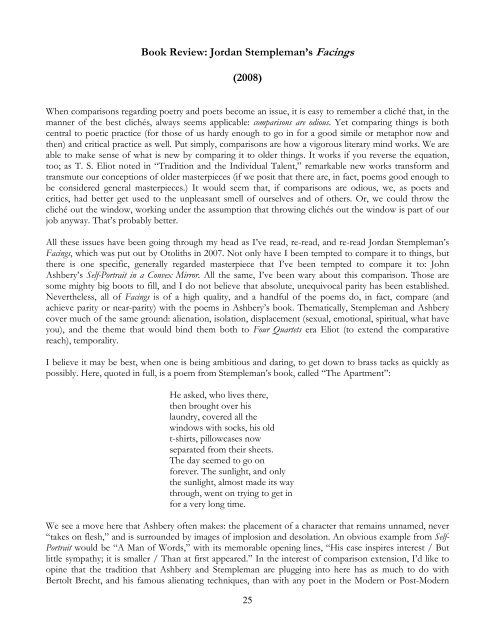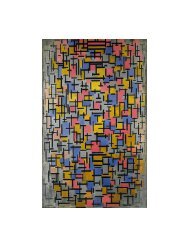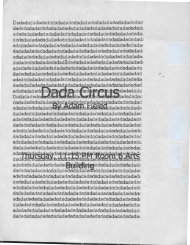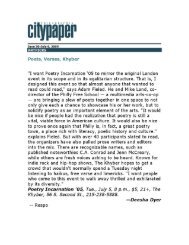3 E-Books: The Argotist Online
These three Adam Fieled collections, The Posit Trilogy, Mother Earth, and Disturb the Universe: The Collected Essays of Adam Fieled, were released in e-book form by The Argotist Online, in 2017, 2011, and 2010, respectively.
These three Adam Fieled collections, The Posit Trilogy, Mother Earth, and Disturb the Universe: The Collected Essays of Adam Fieled, were released in e-book form by The Argotist Online, in 2017, 2011, and 2010, respectively.
Create successful ePaper yourself
Turn your PDF publications into a flip-book with our unique Google optimized e-Paper software.
Book Review: Jordan Stempleman’s Facings<br />
(2008)<br />
When comparisons regarding poetry and poets become an issue, it is easy to remember a cliché that, in the<br />
manner of the best clichés, always seems applicable: comparisons are odious. Yet comparing things is both<br />
central to poetic practice (for those of us hardy enough to go in for a good simile or metaphor now and<br />
then) and critical practice as well. Put simply, comparisons are how a vigorous literary mind works. We are<br />
able to make sense of what is new by comparing it to older things. It works if you reverse the equation,<br />
too; as T. S. Eliot noted in “Tradition and the Individual Talent,” remarkable new works transform and<br />
transmute our conceptions of older masterpieces (if we posit that there are, in fact, poems good enough to<br />
be considered general masterpieces.) It would seem that, if comparisons are odious, we, as poets and<br />
critics, had better get used to the unpleasant smell of ourselves and of others. Or, we could throw the<br />
cliché out the window, working under the assumption that throwing clichés out the window is part of our<br />
job anyway. That’s probably better.<br />
All these issues have been going through my head as I’ve read, re-read, and re-read Jordan Stempleman’s<br />
Facings, which was put out by Otoliths in 2007. Not only have I been tempted to compare it to things, but<br />
there is one specific, generally regarded masterpiece that I’ve been tempted to compare it to: John<br />
Ashbery’s Self-Portrait in a Convex Mirror. All the same, I’ve been wary about this comparison. Those are<br />
some mighty big boots to fill, and I do not believe that absolute, unequivocal parity has been established.<br />
Nevertheless, all of Facings is of a high quality, and a handful of the poems do, in fact, compare (and<br />
achieve parity or near-parity) with the poems in Ashbery’s book. <strong>The</strong>matically, Stempleman and Ashbery<br />
cover much of the same ground: alienation, isolation, displacement (sexual, emotional, spiritual, what have<br />
you), and the theme that would bind them both to Four Quartets era Eliot (to extend the comparative<br />
reach), temporality.<br />
I believe it may be best, when one is being ambitious and daring, to get down to brass tacks as quickly as<br />
possibly. Here, quoted in full, is a poem from Stempleman’s book, called “<strong>The</strong> Apartment”:<br />
He asked, who lives there,<br />
then brought over his<br />
laundry, covered all the<br />
windows with socks, his old<br />
t-shirts, pillowcases now<br />
separated from their sheets.<br />
<strong>The</strong> day seemed to go on<br />
forever. <strong>The</strong> sunlight, and only<br />
the sunlight, almost made its way<br />
through, went on trying to get in<br />
for a very long time.<br />
We see a move here that Ashbery often makes: the placement of a character that remains unnamed, never<br />
“takes on flesh,” and is surrounded by images of implosion and desolation. An obvious example from Self-<br />
Portrait would be “A Man of Words,” with its memorable opening lines, “His case inspires interest / But<br />
little sympathy; it is smaller / Than at first appeared.” In the interest of comparison extension, I’d like to<br />
opine that the tradition that Ashbery and Stempleman are plugging into here has as much to do with<br />
Bertolt Brecht, and his famous alienating techniques, than with any poet in the Modern or Post-Modern<br />
25

















